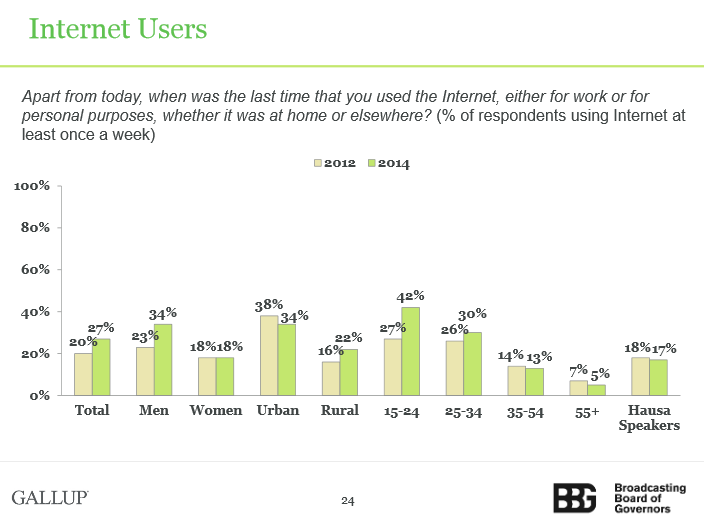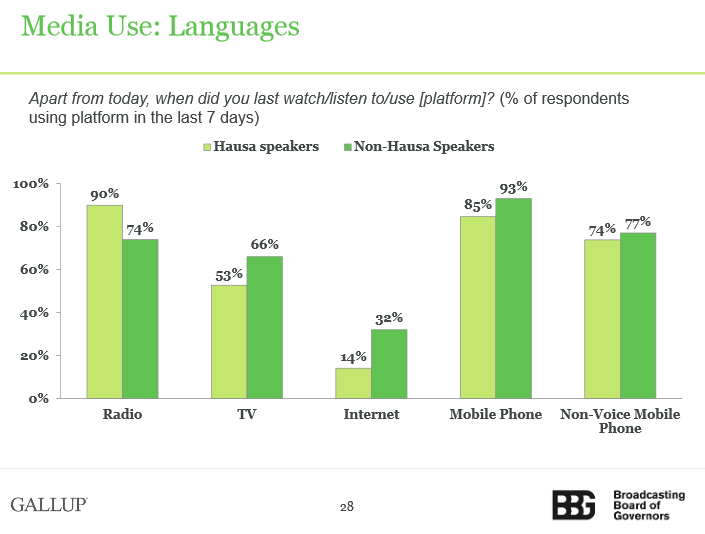The typical Nigerian Internet user (if such a person exists) is a 15-34 year-old educated urban-dwelling male with a mobile
As part of an ongoing series of media habits studies in developing countries, Gallup and the Broadcasting Board of Governors are researching contemporary media use in Sub-Saharan African countries, including Nigeria. Such surveys are excellent indicators of how Nigerians are utilizing mobile phone to access information. The statistics are current and are not lagging by two years, as is the case with many other datasets.
A nationally representative face-to-face survey of 4,000 people aged 15 and older living in Nigeria was conducted in January 27 – March 21, 2014 to better understand current media usage habits. Furthermore, to capture a true sense of how media is used, the surveys were given in English, Hausa, Yoruba, Igbo, and Pidgin, as necessary. No one in Borno state was interviewed due to security concerns.
The use of digital media is rapidly growing in Nigeria and news is often accessed via mobile. Radio, word of mouth, and television are by far the most common news platforms. Internet is generally the fourth most common source, with 28% of Nigerians using it to read the news at least weekly. Broadly speaking, the typical Nigerian Internet user is a 15-35 year-old male with at least a secondary education who lives in an urban setting and understands English.
Specifically, some intriguing stats:
- 28% use the Internet at least weekly for news (up from 23% in 2012)
- More than half of Nigerians aged 34 or younger receive news through SMS
- More households own a mobile phone (87%) than radio (83%) or television (74%)
- Half of those who do not own a mobile phone (17%) have access to someone else’s phone
- Personal mobile phone ownership increased by 10 points over the past two years and will soon be universal
- Still, mobile ownership of those with less than a secondary education is at 71%
- Home internet access grew from 7.5% in 2012 to 23% in 2014
- 96% of weekly Internet users access the Internet using a mobile
- The rate of household computer ownership has been flat at 10% since 2012
- Men tend to own phones more often than women due to greater individual purchasing power
- 62% of those with a post-secondary education have used the Internet in the past week (vs. 8% of those with only a primary education)
- Youth (aged 15-24) are 4x more likely than those aged 35+ to go online in a given week
- 32% of those who have mobile access went online within the past week (22% used social networking)
- Half of young mobile phone users had accessed social media or the Internet in the past week
- In 2012, 28% of weekly Internet users accessed the Web from an Internet café most often. This number dropped to 2% in 2014.
- Most Nigerians access the Internet from home (83%) or from multiple locations using a mobile (67%)
- Internet use at work is low at 34%
- Most common online activities are reading the news (79%), reading blogs (64%) and sharing media (61%)
- Two-thirds of Nigerians have heard of social networking but less than one-third have used a social network in the past week
- Of those who use social media, 93% use Facebook and 68% use 2GO
No question explicitly asked about online media freedom, though a 2013 survey found a decline in perception of media freedom, especially by those living in the North.
Source: “Contemporary Media Use in Nigeria – Research Brief,” BBG & Gallup, BBG Research Series, 2014.














 Twitter
Twitter Facebook
Facebook Pinterest
Pinterest